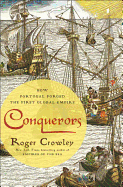
In works such as City of Fortune, Empires of the Sea and 1453, historian Roger Crowley focused on the struggles between the Renaissance powers--Christian and Muslim alike--over who would control the Mediterranean and the lucrative trade between East and West. In Conquerors: How Portugal Forged the First Global Empire, Crowley moves his account outside the Mediterranean to follow Portugal's maritime explorations down the coast of Africa, and its gunpowder-fueled entrance into the Indian Ocean.
Crowley expands the familiar stories of the Age of Exploration into an account that is darker and more complicated than the version presented in world history texts. He does not downplay Portugal's expansion of nautical technology and geographic knowledge, or the heroic feats of courage, endurance and seamanship involved in its global expansion. Instead, he places both knowledge and heroism within a historical context that explains them both. Poised between the era of the Crusades and the Renaissance, the Portuguese explorations were driven as much by the desire to forge an alliance with the mythical Christian king Prester John against the Muslims, as by the desire for gold and spices. That crusading instinct and a fundamental lack of knowledge about Asia and the Middle East meant that the Portuguese entered the trading world of the Indian Ocean with guns blazing. The result was a series of misunderstandings and violent encounters that resulted in Portuguese control of the maritime East-West trade--laid out by Crowley in gruesome and fascinating detail. --Pamela Toler, blogging at History in the Margins

